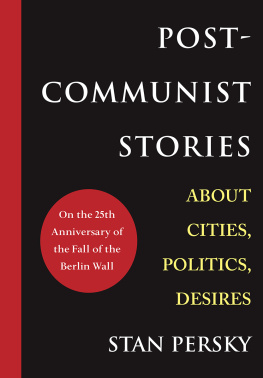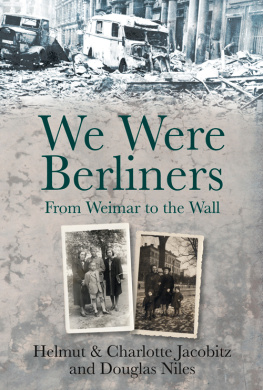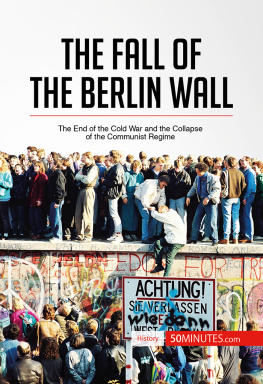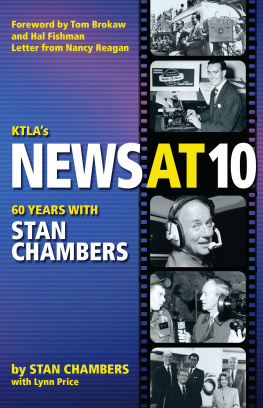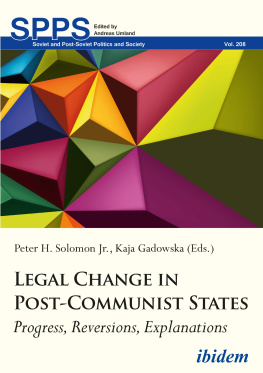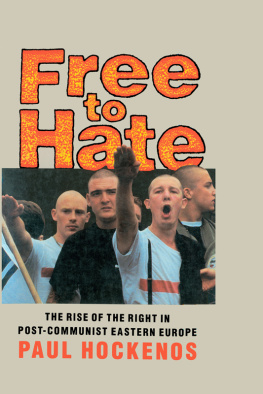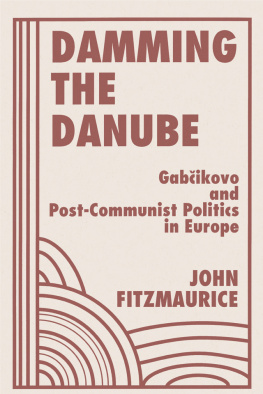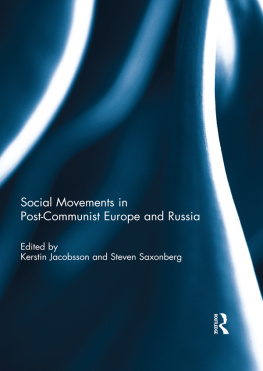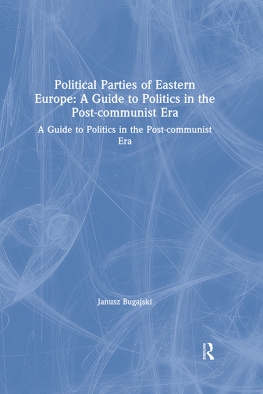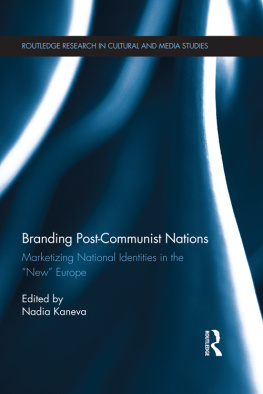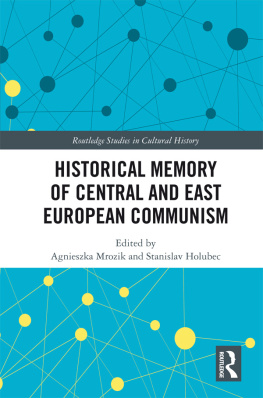POST
COMMUNIST
STORIES
ALSO BY STAN PERSKY
Lives of the French Symbolist Poets (1967)
Wrestling the Angel (1977)
Son of Socred (1979)
The House That Jack Built (1980)
At the Lenin Shipyard: Poland and the Rise of the Solidarity Trade Union (19 81)
The Solidarity Sourcebook
(1982, edited with HENRY FLAM)
Flaunting It: A Decade of Gay Journalism from The Body Politic
(1982, edited with ED JACKSON)
Bennett II (1983)
America, the Last Domino: U.S. Foreign Policy in Central America Under Reagan (1984)
The Supreme Court of Canada Decision on Abortion
(1988, edited with SHELAGH DAY)
Fantasy Government: Bill Vander Zalm and the Future of Social Credit (1989)
Buddys: Meditations on Desire (1989 , 1991)
Mixed Media, Mixed Messages (1991)
Then We Take Berlin: Stories from the Other Side of Europe (1995)
Autobiography of a Tattoo (1997)
Delgamuukw: The Supreme Court of Canada Decision on Aboriginal Title
(1998, edited with commentary )
On Kiddie Porn: Sexual Representation, Free Speech and the Robin Sharpe Case
(2001, with JOHN DIXON)
The Short Version: An ABC Book (2 005)
Topic Sentence: A Writers Education (2007)
Robin Blaser
(2010, with BRIAN FAWCETT)
Reading the st Century: Books of the Decade, 2000 2009 (2011)
POST
COMMUNIST
STORIES
ABOUT
CITIES,
POLITICS,
DESIRES
On the 25th Anniversary of the Fall of the Berlin Wall
STAN PERSKY
Copyright 2014 Stan Persky
This edition copyright 2014 Cormorant Books Inc.
No part of this publication may be reproduced, stored in a retrieval system or transmitted, in any form or by any means, without the prior written consent of the publisher or a licence from The Canadian Copyright Licensing Agency (Access Copyright). For an Access Copyright licence, visit www.accesscopyright.ca or call toll free 1.800.893.5777.
The publisher gratefully acknowledges the support of the Canada Council for the Arts and the Ontario Arts Council for its publishing program. We acknowledge the financial support of the Government of Canada through the Canada Book Fund (CBF) for our publishing activities, and the Government of Ontario through the Ontario Media Development Corporation, an agency of the Ontario Ministry of Culture, and the Ontario Book Publishing Tax Credit Program.
LIBRARY AND ARCHIVES CANADA CATALOGUING IN PUBLICATION
Persky, Stan, 1941, author
Post-communist stories : about cities, politics, desires /Stan Persky.
Issued in print and electronic formats.
ISBN 978-1-77086-446-7 (pbk.). ISBN 978-1-77086-447-4 (html)
1. Europe, Eastern Politics and government 1989. 2. Europe, Central
Politics and government 1989. 3. Europe, EasternSocial conditions 1989.
4. Europe, Central Social conditions 1989.
5. Europe, Eastern--Intellectual life1989.
6. Europe, Central Intellectual life 1989. i. Title.
DJK51.P47 2014 943.0009049 C2014-906020-3 C2014-906021-1
Cover design: Angel Guerra/Archetype
Interior text design: Tannice Goddard, Soul Oasis Networking
Printer: Marquis
eBook development: WildElement.ca
Printed and bound in Canada.
The interior of this book is printed on 100% post-consumer waste recycled paper.
CORMORANT BOOKS INC.
10 ST. MARY STREET, SUITE 615, TORONTO, ONTARIO, M4Y 1P9
www.cormorantbooks.com
for Tom Sandborn
in memory of my father,
Morris Persky
Neither was it as it first seemed
Nor as you now make it into a story.
CZESAW MIOSZ
Contents
Preface
P ost-Communist Stories is a reflection of my long-standing interest in central European politics, life, and culture (especially literary culture) that began in 1980 , the year of the emergence of the Solidarity trade union movement in the shipyards of Gdansk, Poland. The next spring, as soon as I had finished the teaching semester at Malaspina College on the west coast of Canada, I travelled to Poland, interviewed shipyard workers about their movement, and wrote At the Lenin Shipyard , which was published later that year. After the fall of Communism in 1989 occurred, I returned to Central and Eastern Europe, touring its post-Communist capitals just months after the governmental changes and interviewing a broad spectrum of people. Again I wrote a book about what I had seen and heard, Then We Take Berlin . Since 1990 , Ive lived part-time in Berlin, and have continued to write about political events and cultural developments.
The present text includes new writing along with significant revisions of pieces of literary non-fiction that I had published in various earlier books. I begin with the story of A Walk in Prague in May 2014 , followed by an autobiographical account of my experiences growing up in a world whose emblematic image was the Iron Curtain. What follows are stories that took shape as I travelled in such places as Tirana, Warsaw, Budapest, Zagreb, Sofia, and Vilnius. These stories include an essay about my sense of Berlin and its history, as well as its place in post-Communist Europe. How the stories took shape is itself a subtheme of the narratives. I conclude with an essay that reflects on the meaning of the end of Communism, and offers some conjectures on how recent events in Ukraine in 20132014 represent a continuation of the hopes that motivated the revolutions that occurred twenty-five years ago. If this writing helps readers, even in a small way, to resist the forgetting of history and what philosopher Martin Heidegger called the forgetting of Being, I will consider that the work has achieved its purpose.
S.P.
Berlin
August 2014
A Walk in Prague (2014)
O n a Saturday morning in Prague, I walked down toward the citys main square from the hotel where some friends and I were staying. We were on spring holiday, and our ten-day trip included stops in Venice, Trieste, Vienna, and Prague. Prague was the last stop on the tour because, well, its a beautiful city the sleeping beauty of Central Europe, writer Timothy Garton Ash called it and it was just a five-hour drive home to Berlin. Id been to Prague a couple of times in the early 1990 s, but I didnt have any special reason to be there now at least not until I took this walk.
Our hotel, located on the winding, gently sloping tpnsk street, had been built within the last decade, and was a Best Western affiliate; but, with its cladding of what resembled dark-stained wooden beams, it had the architectural look of a four-storey postmodernist log cabin. Its odd facing seemed of a piece with my idea of Czech culture in general quirkily experimental and armed with a barbed sense of humour. The hotel services pamphlet in my room boasted that Jaroslav Haek ( 18831923 ), one of the three great Czech writers of the first half of the twentieth century (the other two are Franz Kafka and Karel apek) and the author of the satirical post-World War I anti-war classic, The Good Soldier Schweik , had been born in the building originally located on the site.
It was the unseasonably chill and damp long weekend of May Day 2014 , the year of the twenty-fifth anniversary of the fall of Communism in Central and Eastern Europe. From the hotel, I walked for a couple of blocks, past the restaurants, banks, shops, and other more posh hotels that line the street, pausing for a second at the entrance to the landmark Lucerna Palace building, and then continued down to the Czech capitals main square, Vclavsk nmst , or Wenceslas Square, as its known in English. The tourists were out in force on this holiday weekend, bundled up against the ten to twelve degree Celsius cold and mist, except for a few leftover partygoers, mostly youthful foreigners travelling in groups, who seemed impervious to the frigid weather, some of them wearing only T-shirts and jeans, having come to Prague on cheap flights for weekend drinking parties. Wenceslas Square named for the tenth-century patron saint of Bohemia, whose equestrian statue sits on a rise at the southern end of the square isnt really square; its an almost kilometre-long narrow rectangle. The square is more of a boulevard that is partially open to traffic, although much of the thoroughfare that morning was under renovation, blocked off by street-work sidings; the few cars were being detoured into side streets.

